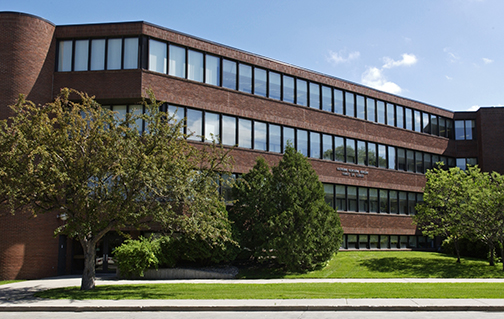
Physics Education
This is an archived copy of the 2019-20 catalog. To access the most recent version of the catalog, please visit https://catalog.ndsu.edu.
Physics is the most fundamental and exact of the physical sciences. Its laws are basic to deep understanding in all of technology, and in many fields of study, such as astronomy, chemistry, engineering, materials science, photonics, biology, medicine, geology, and environmental science.
The Program
Candidates in the Physics Education major are prepared to teach a diverse curriculum to a diverse student population. The physics education student should work closely with an advisor to be sure that the general education courses taken will provide a strong foundation for the advanced courses in the major.
Professional Education Courses
Students may enroll in the 300-level professional education courses before being formally admitted to the School of Education (SOE). Prior to enrolling in the 400-level courses, students must complete the application for admission to the SOE; attain a minimum of a 2.75 grade point average overall in their course work, education courses, and teaching specialty courses; and pass the Core Academic Skills for Educators exam(s). Requirements for admission can be found on the School of Education website.
Student Teaching
Student teaching is the culmination of the teaching program. Students have the opportunity to apply skills acquired in college courses under the supervision of an experienced physics educator.
Student Advisement
Students will be assigned individual advisors who will work closely in program planning and in other ways to advise and assist them. Students are encouraged to seek their advisors' help whenever needed.
Certification
Upon completing this program, students are eligible for certification to teach physics in most states. The program is accredited by the National Council for Accreditation of Teacher Education (NCATE).
Career Opportunities
Students who major in Physics education get hired to teach physical science and physics at the high school level. To expand their choices, students can elect to double major in Physics Education and Physics or take additional science coursework in other disciplines to increase teacher licensure areas. Graduates can also work in industry with the Physics major.
Please note this is a sample plan of study and not an official curriculum. Actual student schedules for each semester will vary depending on start year, education goals, applicable transfer credit, and course availability. Students are encouraged to work with their academic advisor on a regular basis to review degree progress and customize an individual plan of study.
| First Year | |||
|---|---|---|---|
| Fall | Credits | Spring | Credits |
| CHEM 150 | 3 | EDUC 321 | 3 |
| CHEM 160 | 1 | MATH 129 or 329 | 3 |
| ENGL 110 or 120 (Based on placement) | 3-4 | MATH 166 | 4 |
| MATH 165 | 4 | PHYS 251 | 4 |
| PHYS 171 | 1 | PHYS 251L | 1 |
| Wellness Gen Ed | 2 | PHYS 251R | 1 |
| Complete Core Academic Skills Exam | |||
| 14-15 | 16 | ||
| Second Year | |||
| Fall | Credits | Spring | Credits |
| EDUC 322 | 3 | COMM 110 | 3 |
| GEOL 105 | 3 | GEOL 106 | 3 |
| GEOL 105L | 1 | GEOL 106L | 1 |
| MATH 265 | 4 | MATH 266 | 3 |
| PHYS 252 | 4 | PHYS 350 | 3 |
| PHYS 252L | 1 | Physics Elective | 3 |
| PHYS 252R | 1 | ||
| Apply to the School of Education | |||
| 17 | 16 | ||
| Third Year | |||
| Fall | Credits | Spring | Credits |
| BIOL 150 | 3 | EDUC 481 | 3 |
| BIOL 150L | 1 | EDUC 489 | 3 |
| EDUC 451 | 3 | ENGL 324 | 3 |
| PHYS 355 | 3 | PHYS 361 | 3 |
| Social & Behavioral Science/Cultural Diversity Gen Ed | 3 | Humanities & Fine Arts Gen Ed | 3 |
| Social & Behavioral Science Gen Ed | 3 | ||
| 16 | 15 | ||
| Fourth Year | |||
| Fall | Credits | Spring | Credits |
| EDUC 486 | 3 | EDUC 485 | 1 |
| PHYS 411 & 411L | 4 | EDUC 487 | 9 |
| PHYS 462 | 3 | EDUC 488 | 3 |
| Elective | 3 | ||
| Humanities & Fine Arts/Cultural Diversity Gen Ed | 3 | ||
| Apply for Student Teaching | |||
| Complete PLT (grades 7-12) Exam | |||
| Complete Subject Area Assessment Exam | |||
| 16 | 13 | ||
| Total Credits: 123-124 | |||
